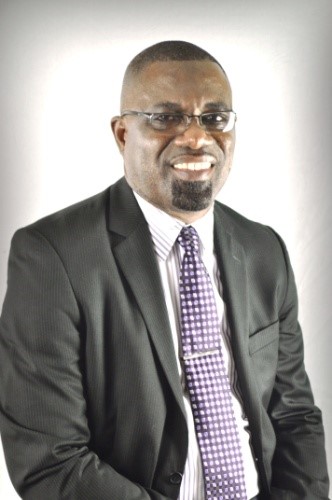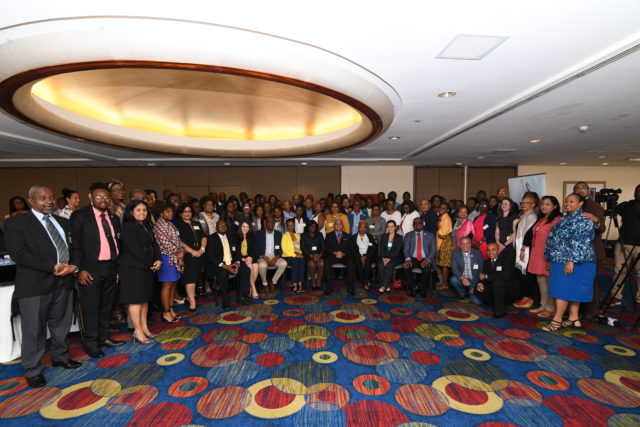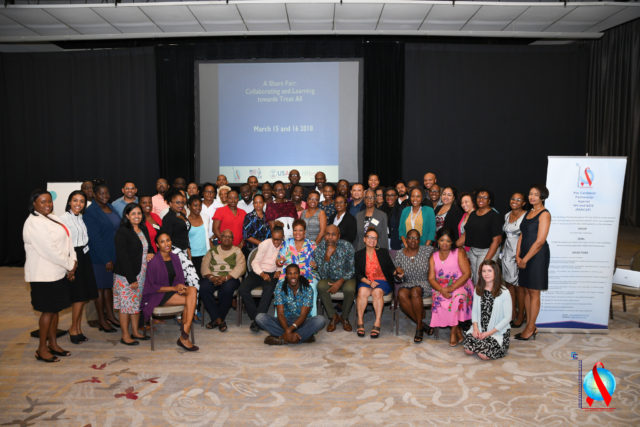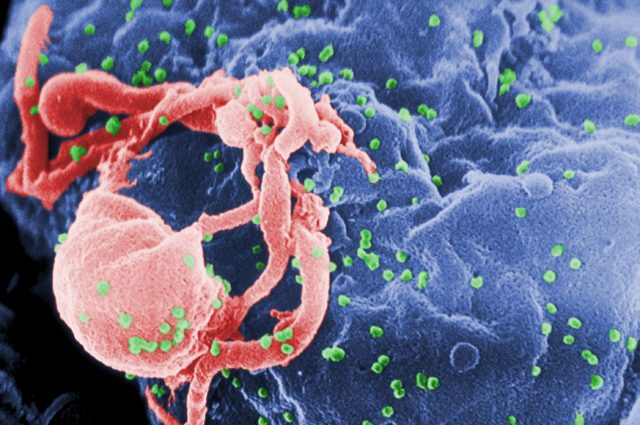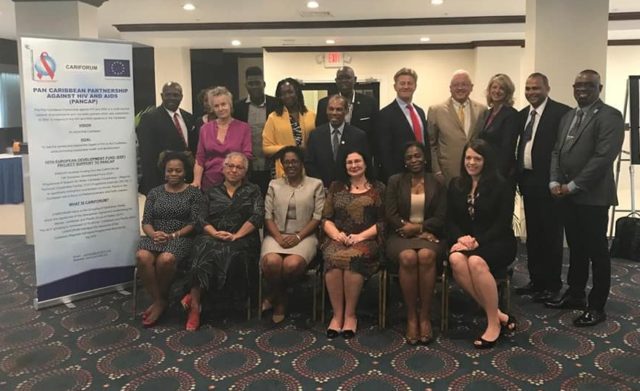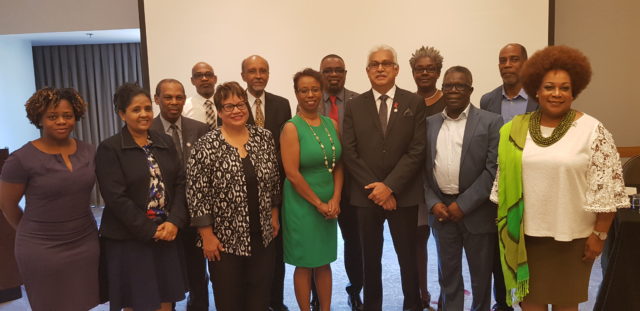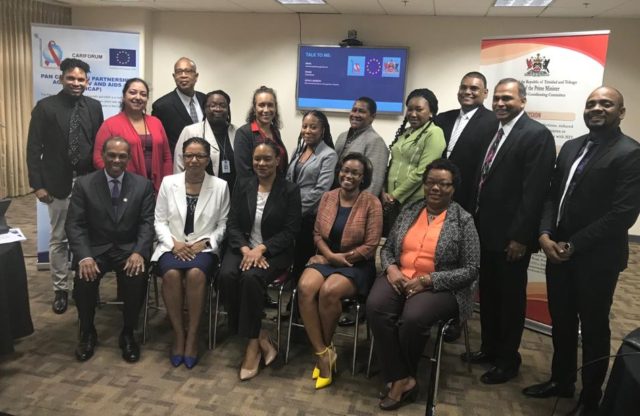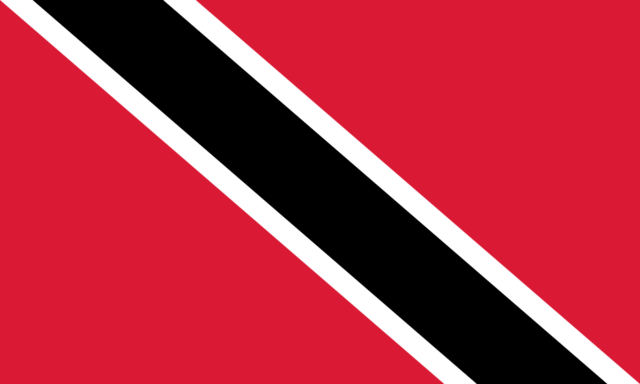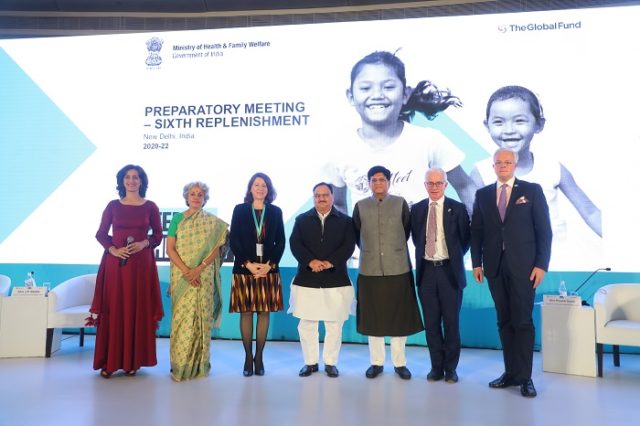Tuesday, 12 March 2019 (PANCAP Coordinating Unit, CARICOM Secretariat): The Pan-Caribbean Partnership against HIV and AIDS (PANCAP), the mechanism that provides a structured and unified approach to the Caribbean’s response to the HIV epidemic, commenced the Seventh Meeting of National AIDS Programme (NAP) Managers and Key Partners in Port-of-Spain, Republic of Trinidad and Tobago on Monday 11 March 2019.
The meeting was hosted 22 months ahead of the end of 2020 deadline for reaching the UNAIDS 90–90–90 Targets — 90% of people living with HIV diagnosed, 90% of diagnosed people on treatment and 90% of those on treatment virally suppressed.
In opening remarks, Director of PANCAP, Mr Dereck Springer highlighted that PANCAP recently evaluated the Caribbean Regional Strategic Framework on HIV and AIDS (CRSF) 2014-2018 and will be using the results to inform the development of the new CRSF 2019-2023. The evaluation found that the Region has made progress in responding to the epidemic but it also clearly illustrated that there is more to be done, particularly in relation to implementation of innovative activities to achieve prevention, retain people in treatment and care, reach key populations with services and create an enabling environment.
“Compared to 2013 when it felt as though we were in the midst of winter, we are now a much more united partnership. We are all PANCAP,” stated the Director, “the Partnership is much stronger and more resilient because of the work being done by everyone. We have demonstrated an indomitable will to overcome the many challenges including financial and human resources in our effort to serve the people of the Caribbean. PANCAP has restored its goodwill; the presence of over 135 partners here today is testimony of this goodwill and a recognition that the PANCAP brand is synonymous with good leadership, respect for partners, meaningful engagement and accountability. There is no other partnership for health like ours”.
The Director stated that there is renewed confidence in PANCAP and this has been achieved because the Partnership has placed people at the heart of the matter. “We have made them central to the Partnership, influencing policy and actively contributing to the decision-making process,” stated Mr Springer, “Our priority was to ensure that those of us within the leadership of the organisation did not become remote and disconnected from the views of the people whom we serve – the people who know best what their needs are and what needs to be done to meet them”.
He further stated that the Partnership is now more visible. “We are sharing our knowledge, we are improving coordination – both alignment and harmonisation,” stated Mr Springer, “We are demonstrating our added value to the Caribbean region. Our strategic regional approach to HIV builds on a strong history of collaboration in public health to overcome the challenges inherent to the unique geography, economy and culture of the Caribbean”.
The Director highlighted that a key objective of PANCAP is to achieve value for money by promoting economies of scale, as the region’s small developing states may provide limited capacity for developing the complex programmes needed for a comprehensive response to HIV.
The partnership marked 18 years of its existence on 14 February 2019. From its inception in 2001, there have been notable successes including the fact that HIV incidence and AIDS-related deaths have been reduced, and seven countries have been certified as having achieved the dual targets for the elimination of mother-to-child transmission of HIV and Syphilis.
Strengthened national programmes have improved capacity to implement prevention, treatment and care activities. “We have built the capacity of civil society and positioned them to access their own funding,” stated Mr Springer, “substantial investments have been made in strengthening health systems and in scaling-up services for increasing numbers of people who are living longer with HIV. Regional public goods and services have facilitated this by lowering costs and reducing inefficiencies inherent in building capacity in multiple countries”. He further stated that countries contribute to, and benefit from, more affordable access to medicines and the sharing of technical skills, operational capacity, information, advocacy and specialised services. PANCAP has supported the OECS Pharmaceutical Procurement System under the Global Fund Round 9 grant, which has now expanded. Technical support is sourced within the region and is implemented through peer-learning methodologies and virtual and face-to-face knowledge sharing events.
“We continue to respond to the needs of the region and we are actively mobilising resources from our development partners such as PEPFAR, the Global Fund and UN agencies, albeit in an environment of scarcity while leveraging the technical expertise of our development partners to support our national governments to increase domestic resources for HIV” stated the Director.
He urged participants to use the meeting to review progress, learn from each other, explore innovative approaches and commit to implementing and scaling them up. “Let us make our voices heard so that we can inform the priorities and strategies for our new CRSF, stated the Director, “Let us be bold. Let us not fear the future, instead let us identify and embrace the many opportunities that present themselves for us to renew, refresh, streamline and refocus. Let us find within ourselves, our invincible summer. I am confident that this Partnership will build upon this solid foundation over the next years and will provide the leadership required for achieving the vision of ending AIDS in the Caribbean region”.
Ms Aldora Robinson, Director of the Health Promotion and Advocacy Unit within the Ministry of Health, Agriculture and Human Services, Turks and Caicos Islands and the National AIDS Programme Managers Representative on the PANCAP Governance Bodies stated that in light of the challenge of reduced international funding the meeting could be a “game changer”. “We cannot continue to do the same thing and expect different results,” stated Ms Robison, “we need to come together, NAP Managers and civil society, with purpose and innovation to accomplish results necessary to close the gap of the 90-90-90 Targets; building on the successes and gains already made”.
She advocated that National AIDS Programme Managers and civil society must work together in their individual countries where the context of the HIV response is often different.
“Each island must own their response,” Ms Robinson stated, “there is a critical need to increase access to HIV and STI Testing for key populations and we also need to pay attention to our 50-year olds and those who have retired. We look forward to an exciting and informative week where purpose meets innovation. We must always remember that we are working towards the same goal of an AIDS-free Caribbean”.
In brief remarks, Mr Ivan Cruickshank, Executive Director, Caribbean Vulnerable Communities (CVC) Coalition, reminded participants of the 2020 deadline for ending AIDS and urged that all stakeholders commit to using the meeting to foster innovative solutions to fill the HIV gaps. “We’re coming in on the heels of the recent UNAIDS report. There is unfinished business, so whatever we do this week, we must connect the dots,” stated the Executive Director, “we’re a Caribbean nation of track and field and we know in track and field, especially in a 400 metres race, the last 10 metres are usually the hardest. For many of us present here today, the last 10 metres are going to be critical. How we respond and how we achieve the targets depend on our collaborative spirit and ability to be innovative”.
Dr Lilian Pedrosa, Fund Portfolio Manager, Latin America and the Caribbean, the Global Fund, stated that it is a pivotal year for the The Global Fund to Fight AIDS, Tuberculosis and Malaria, which is approaching another replenishment period and attempting to secure additional funding to continue supporting the Global Fund grants. She reminded the meeting that the Global Fund has been supporting the Region since 2001, disbursing over US$800 Million specifically for the Caribbean Region. She applauded the success of the Region in achieving the decline of deaths from AIDS, as well as the decline in new infections. She also lauded the achievement of the validation of seven countries for the elimination of Mother-to-Child Transmission of HIV and Syphilis.
Dr Pedrosa emphasized that the Region should also be commended for the increase of domestic contributions for HIV. “When the Global Fund started as a partner in 2001, together with other partners, we were funding most of the response”, stated Dr Pedrosa, “What we have seen in the last few years is a new momentum where countries are really stepping up the plate and increasing their financial commitment to sustain the gains made in the fight against AIDS”.
She noted that despite the successes and increased domestic financing, there is the challenge of reaching the right key populations and increasing testing. She also noted there are some countries where the bulk of the epidemic is concentrated in key populations and national programmes continue to be challenged with retaining people in care. She emphasized however, that the most significant challenge faced by the response is stigma and discrimination.
She challenged the participants to utilize the meeting to reflect on the lessons learned from national programmes and to build on the unique partnership created by PANCAP. She also urged participants to use the resources and expertise within the Partnership to advocate within their countries for an end to stigma and discrimination. “We need to reach the finish line for ending AIDS together, as one Caribbean”, stated Dr Pedrosa.
Dr James Guwani, Team Leader, UNAIDS Caribbean Office, highlighted that the Caribbean joined the community of nations in a commitment to end the AIDS epidemic by 2030 as part of the Sustainable Development Goal agenda. Next year, 2020, the Region will reach a key benchmark to determine whether it is on course to realize the vision of a world without AIDS. He emphasized that every country will ask how close they are to diagnosing 90% of people living with HIV, to starting 90% of diagnosed people on antiretroviral therapy and to achieving viral suppression among 90% of those on treatment.
“While it is urgent and important that we press forward, I urge all of us as partners in the Caribbean AIDS response to first look back,” stated Dr Guwani. He shared that in 2004 and 2005 the region experienced an estimated 18,000 AIDS-related deaths. In 2017, that number had fallen by more than 40%. From 1997 to 2000, there were an estimated 30,000 new infections annually in the Caribbean. By the end of 2017, that number was reduced by half. In 2015, 45% of all people living with HIV in this region were on treatment. Two years later that number had increased to 57 percent—well over half of the HIV positive population.
Dr Guwani further stated that the numbers tell the story of a region that has gotten many things right including widespread access to treatment, increased testing availability and some traction with respect to prevention. “These strides are in large part thanks to the people and partnerships in this very room,” stated Dr Guwani, “As we redirect our attention to the uphill battle before us, let us remind ourselves of our capacity to mobilize leaders and communities, to inform and sensitize citizens and to treat and care for those living with HIV. We have what it takes to end this epidemic. We must now ask how we can harness our expertise, resources and passion to reach those who have not benefitted from the services on offer”.
He emphasized that the big picture is that in 2017, 73% of Caribbean people living with HIV knew their status, 79% of diagnosed people were on treatment and 70% of those on treatment were virally suppressed.
Dr Guwani challenged the meeting to answer the following questions: why are quarter of those testing positive in the Caribbean diagnosed late, why do so many people not stay the course having started treatment, and why aren’t prevention efforts reaching enough of the young people who now account for almost one-third of new infections in the region.
He urged the participants to combine evidence, analysis and insights to determine what the Region should do differently in order to reach the youth, men, women and members of key and vulnerable communities who continue to be left behind.
Ms Victoria Nibarger, PEPFAR Coordinator, Caribbean Regional Program, Office of the Global AIDS Coordinator and Health Diplomacy (S/GAC), Jamaica highlighted the recent case of a man living with HIV in London who had been “functionally cured” of HIV, following a bone marrow transplant from an HIV-resistant donor. She noted that more than 18 months have passed since the man last took ARVs, and there remains no trace of HIV in his blood. She shared that Anton Pozniak, President of the International AIDS Society, called it a “critical moment” in terms of the fight against HIV, but emphasized that at present it does not offer a large-scale strategy for a cure.
“I have no doubt that we are all united in our hope for a scalable cure,” stated the PEPFAR Coordinator, “but even in the meantime we have a historic opportunity to make what once seemed impossible possible – controlling and ultimately ending HIV as a public health threat around the world”.
She highlighted that when the United States government launched PEPFAR in 2003, HIV was a death sentence in many parts of the world. Thanks to the lifesaving efforts of PEPFAR and its partners, the world is a more secure place. Ms Nibarger explained that with strong bipartisan support across three U.S. Presidents and nine U.S. Congresses and working with our many partners around the globe, PEPFAR has invested more than 80 billion U.S. dollars in the global HIV response. The results have been incredible: more than 17 million lives saved, prevented millions of new HIV infections, and created the roadmap to controlling the pandemic.
The PEPFAR Coordinator emphasized that the region cannot achieve epidemic control so long as any one country is lagging behind. She stated, “This Seventh Annual Meeting is an invaluable opportunity for those of us working throughout the Caribbean to come together, to learn from one another, to strategize and to strengthen our joint resolve to combat HIV. This meeting can serve as a troubleshooting forum. I am confident that the collective wisdom on all fronts – health, culture, and politics – is sufficient to overcome challenges that are being faced”.
She challenged participants to devote significant attention to the 90-90-90 Targets, for a progress check as 2020 approaches. The cascade for the collective region is approximately 73-57-40 of all people living with HIV.
Ms Nibarger applauded the Region for being well on its way to achieving the First 90. “We need to review testing strategies to ensure they are maximally efficient and that we are not over-testing certain populations, stated the PEPFAR Coordinator, “PEPFAR firmly believes that index testing and partner notification services are essential to ensuring that at least 90 percent of individuals know their status. We are confident that this is possible to do across the Caribbean, despite challenges related to stigma, discrimination and violence”.
She further stated that despite the great strides in implementation of Treat All, the percentage of those diagnosed who are on treatment remains low – around 57 percent of all PLHIV for the region. She urged the participants to work together to rapidly expand treatment coverage with the goal of every individual who is diagnosed with HIV rapidly initiating ART. She emphasized that there is overwhelming evidence that this policy results in better patient outcomes, stronger adherence and higher viral suppression rates.
“We believe the adoption of TLD (fixed-dose combination of tenofovir 300mg /lamivudine 300mg /dolutegravir 50mg (TLD), as a first-line regimen is essential to ensure better adherence and clinical outcomes. Differentiated service-delivery models, such as 6-month scripting, are more convenient for patients and can help to ease crowding at treatment facilities and pharmacies,” stated Ms Nibarger.
She further stated that the final 90 – viral suppression – has the farthest to go, with the current regional figure at about 40 percent. “We support the scale-up of viral load testing, which will help to ensure optimal clinical outcomes”.
On the issue of sustainability, the PEPFAR Coordinator explained that the PEPFAR budget for the Caribbean Regional Programme will be reduced for the next fiscal year, “We will closeout our bilateral programming in Suriname this Fall, followed by a planned closeout in Guyana and Barbados in Fall 2020. At this time, we do not have planned closeout dates in Jamaica or Trinidad and Tobago. As donor resources decline, host governments are taking on more of the financing – and this is commendable. We believe it is critical that governments continue to learn from one another about how to successfully mobilize domestic resources to strengthen sustainability and prepare for donor transition. As such, we look forward to the roadmap for sustainability that is an expected outcome of this meeting”.
She further stated “Treat All, index testing, multi-month scripting, viral load scale-up, increasing government resources are some of the minimum requirements for our 2019 PEPFAR Regional Operational Plan. They are WHO-supported policies and practices that PEPFAR is requesting to be in place ahead of our new fiscal year. There is strong evidence that they are necessary for efficient and effective programmes, which enable the reduction of HIV transmission and, eventually, epidemic control”
Ms Nibarger highlighted that despite the changes, she can confirm that PEPFAR remains fully committed to the sustainability of the Partnership, “It is these partnerships that make progress, and our joint goal of reaching the 90-90-90 targets, possible. We have heard you, our partners; we will not reach our goals if we focus only on services for members of key populations who are comfortable disclosing their status. Not everyone is willing or able to disclose. Therefore, we are proposing new strategies – including men’s health clinics – to broaden our reach and ensure that our PEPFAR dollars are finding those who need help.
We are looking at ways to support integrated service-delivery models that will better provide for the holistic needs of patients. We want to increase knowledge of private practitioners and their contributions to the HIV response as well as to link them to our clinical-mentoring activities. We aim to strengthen direct partnerships with local non-governmental organizations who are integral to the response”.
The PEPFAR Coordinator emphasized that PEPFAR worldwide will continue to prioritize strategic information, as decisions must be data-driven. She explained that it is through strong strategic information systems that the most accurate picture of the epidemic can be seen as well as the identification of areas where interventions are working, outstanding gaps, and efficient use of collective resources.
“This time together presents a great opportunity. I am hopeful that we will come away from this meeting with new ideas about how to accelerate progress toward 90-90-90. I hope that we will further strengthen the commitment to international best practices and figure out how we can adapt them to fit the context of the Caribbean region as well as individual countries. Just like with the news of the patient in London being “functionally cured,” progress is happening, and we have reason to be optimistic. Together, we can – and we will – end the HIV pandemic in the Caribbean,” stated Ms Nibarger.
Ms Sandra Jones, Technical Advisor HIV/STI, TB and Viral Hepatitis PAHO/WHO – Sub-regional Program Coordination, Caribbean highlighted that over the last 3-5 years the region has made progress towards reversing the HIV epidemic, achieving a reduction in the number of new HIV infections by 18% and deaths by 23%. “However, as demonstrated by the evaluation of the CRSF 2014-2018, there are gaps and challenges, resulting in uneven progress in the region”, stated Ms. Jones, “while there has been progress in placing more people living with HIV on treatment, much more needs to be done to increase the numbers and to retain people on treatment. In fact, significant effort is required for the Caribbean to achieve the UNAIDS 90-90-90 targets”.
She stated that the region has a unique opportunity to address the challenges, accelerate actions and close the gaps with specific indicators for HIV, the Sustainable Health Agenda for the Americas, the HIV fast-track targets and evidence-based interventions. She also stated that Regional Frameworks such as the CRSF, the Caribbean Cooperation in Health coupled with a strong primary care system in each of the Member States, and committed partners can assist the region in achieving the 90-90-90 targets.
Ms Jones emphasized that paramount to achieving the 2030 goal of ending AIDS is a paradigm shift. She stated, “The time to be innovative is now, given the overwhelming evidence for HIV prevention and treatment that are currently available. The rapid implementation of different innovations and evidence-based interventions for HIV prevention, care and treatment which include Pre-exposure prophylaxis (PrEP), Post Exposure Prophylaxis-PEP, self-testing, Treat All, as well as sexually transmitted infection (STI) prevention and Control, with emphasis on key populations and migrants, should be delivered in a more cohesive, integrated manner, focusing on universal access and coverage for everyone. The delivery of an integrated service for HIV and STI must continue to include civil society organizations. Providing linkage to care will ensure that “the unreached is reached, leaving no one behind”.
She further stated, “One of the achievements that the region is proud of is the Elimination of Mother-to-child Transmission of HIV and Syphilis (EMTCT). The Caribbean is a leader in EMTCT. Besides the validation of Cuba and six other Caribbean Countries in 2015 and 2017, seven of the nine countries validated are from the Caribbean. This achievement is possible due to the primary health care focus and the integration of HIV and Syphilis primary prevention and treatment services into national maternal and child health programme”.
Ms Jones explained that as a result, the estimated coverage of HIV testing among pregnant women increased from 58% in 2010 to 73% in 2017, while ART coverage for HIV+ mothers increased from 50% in 2010 to 75% in 2017. All these have resulted in a 27% reduction of new infections among infants from 2010 to 2017, with an estimated 5,800 new HIV cases averted.
She stated, “let us all remember that the elimination of the mother-to-child transmission, which we thought was not possible, is a tangible commitment to universal health and brings us closer to ending AIDS and other STIs as a public health problem in the Caribbean.
Ms Jones reaffirmed PAHO’s commitment to work hand-in-hand with Member States and with all partners including civil society organizations to provide the necessary policy advice, technical support and capacity building so that the Region can collectively reverse the HIV epidemic, ending AIDS and priority STIs as public health problems in the Caribbean.
Hon. Terrence Deyalsingh, Minister of Health, Republic of Trinidad and Tobago and Chair, PANCAP Executive Board highlighted that the HIV programmatic interventions by necessity also require political will, strategic leadership, good governance and an overall unrelenting bravery. He emphasized the need to analyse evidence in a sovereign way that is cognizant of the unique country socio-cultural and economic context for executive decision-making.
He stated that winning and losing battles among programmes, policies and legislative agendas must not daunt the focus on the war against the HIV epidemic, and improved quality of life for those living with and affected by HIV.
He shared that in 2015 Trinidad and Tobago had an uncertain future for the National AIDS Coordinating Committee (NACC) that became a loose amalgam to the health-based HIV and AIDS Coordinating Unit (HACU). There was staff attrition, minimal spending of US funds from the PEPFAR programme from 2010 to 2015 and the characteristic of the epidemic was still ill-defined in an embryonic case-based surveillance system and further stymied by these governance battles. “As a country, we were still quoting cases ever diagnosed as over 20,000 cases to characterize our evidence base for advocacy and decision-making without knowledge of all deaths, including those related to AIDS. The country was beginning to slowly recognize that the Spectrum UNAIDS estimates were congruous with the truer reality of 11,000 persons being alive and living with HIV.
The Minister explained that in 2015 and 2016 there was a reintegration of the NACC into the Office of the Prime Minister to oversee HIV Prevention activities particularly in spheres of community engagement through social and NGO support services, addressing childhood sexual, age and gender appropriate education as well as, child abuse and domestic violence. This brought back purpose to the health-based HIV Unit to contribute to the national HIV programme as overseen by the NACC through preserving the traditional gains in HIV testing expansion and HIV treatment and unravelling and tackling the case-based surveillance and adopting the 90-90-90 cascade histogram to guide national decision making.
“This refocus was synergistic with the 2016 UNAIDS global resolutions and with the local arm of PEPFAR’s strategic realignment of their prevention and strategic information goals to increase persons on Antiretroviral (ART) and strengthen case-based surveillance,” stated Minister Deyalsingh, “The deliberate re-engagement of PEPFAR saw a then fledgling expenditure up to 2015, increase greatly in the 2016 and 2017 fiscal years. This has assisted Trinidad and Tobago to move closer to the desired 2020 Fast Track Targets from a HACU reported 2015 baseline 90-90-90 achievements of 83-74-42, to an overall target of 79-78-87 in 2017”.
Minister Deyalsingh emphasized that Trinidad and Tobago’s roadmap offers the words and phrases of steadfast, evidence-driven, organizational and political will, and willingness to change and innovate. “A reiterated call to get technical support for country case-based surveillance systems, opt-out testing as an accelerated strategy at select health care facilities that address STI, TB, mental health, substance abuse and hospital ward admissions and mental health focus on treatment adherence are key” stated the Minister.
The Minister further stated that the HIV epidemic has been better understood and managed more aggressively in the last three years with a trajectory to further improve. “The AIDS epidemic can be ended on, or before 2030,” stated Minister Deyalsingh, “We need to be honest and look hard at what the national evidence and national socio-economic situation are sometimes screaming at us to do. There is an overdue need to collaborate in an atmosphere of mutual respect beginning with countries recognizing the global comparator of apples with apples with regional partners. However regional and multilateral agencies must also accept that despite all the recommended plethora of actions that a sovereign country’s self-determined narrow critical path for success should be fully supported”.
Minister Deyalsingh challenged the participants to use the forum to highlight country positions, programmes and policy initiatives to provide not the “typical problem tree decorated with obstacles, but the solution tree decorated with the Caribbean resolve, as led by PANCAP to permanently root out these obstacles that must be perceived as only short-term programme gaps”.
The Minister commended the exceptional and creative leadership of the Director of PANCAP. He noted that the Region will owe him a debt of gratitude when it achieves the UNAIDS 90-90-90 targets. He acknowledged the presence of the youth – CARICOM Youth Ambassadors and key population leaders – to whom he urged that the baton be passed to lead the response in the future.
– ENDS –
Helpful links:
Seventh Meeting of the National AIDS Programme Managers and Key Partners Event web page
https://pancap.org/pancap-events/7th-meeting-of-the-national-aids-programme-managers-and-key-partners/
Global AIDS Update 2018 – Miles to Go
https://pancap.org/pancap-documents/global-aids-update-2018-miles-to-go/
Caribbean Regional Strategic Framework on HIV and AIDS
https://pancap.org/pancap-documents/caribbean-regional-strategic-framework-on-hiv-and-aids-2008-2012/
What is PANCAP?
PANCAP is a Caribbean regional partnership of governments, regional civil society organisations, regional institutions and organisations, bilateral and multilateral agencies and contributing donor partners which was established on 14 February 2001. PANCAP provides a structured and unified approach to the Caribbean’s response to the HIV epidemic, coordinates the response through the Caribbean Regional Strategic Framework on HIV and AIDS to maximise efficient use of resources and increase impact, mobilises resources and build capacity of partners.
Editor’s Notes
What are the Joint United Nations Programme on HIV and AIDS (UNAIDS) 90-90-90 Targets?
- By 2020, 90% of all people living with HIV will know their HIV status.
- By 2020, 90% of all people with diagnosed HIV infection will receive sustained antiretroviral therapy.
- By 2020, 90% of all people receiving antiretroviral therapy will have viral suppression.
Background to the National AIDS Programme Managers and Key Partners Meeting
The Caribbean Regional Strategic Framework (CRSF) 2014-2018 articulates the vision and collective priorities of Caribbean states through their membership in the Pan Caribbean Partnership against HIV and AIDS (PANCAP). The core premise is that stemming the HIV epidemic in the Caribbean rests on the commitment, capacity and leadership of national authorities and effective response. The primary goal of regional collaborative efforts is to support country responses by addressing common challenges in the areas of evidence-based policy formulation, and innovative responses to addressing legislative gaps, resource mobilisation, coordination and technical assistance., An effective regional response, guided by the CRSF 2014-2018, therefore requires that the links and interfaces between country programmes and regional support programmes be defined and agreed to by country partners. This is critical for strengthening country ownership of the PANCAP response and a shared responsibility to strategically align efforts to end HIV as a public health problem in the Caribbean.
The National AIDS Programme Managers and Key Partners Meeting provides an opportunity for joint decision-making in setting programmatic priorities and identifying partner contributions in order to strategically align efforts in the fight against HIV. The Meeting Agenda is intended to allow for in-depth analysis and discussion on the relevant aspects of the UN Post 2015 Agenda, and the overall advancements of the Caribbean Region in implementing new initiatives for HIV. It is within this context that opportunities and challenges for the Region and individual countries to expand the national responses will be discussed. PANCAP acknowledges the need for greater attention to intercountry linkages and greater collaboration with regional partners. This will serve to maximise synergies and provide a mechanism for making regional public goods available to national programmes to enhance their delivery and impact.

